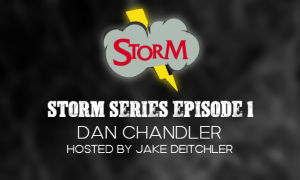The new international season is upon us, which makes this the perfect time to catch up with legendary three-time Olympian and Minnesota Storm head coach Dan Chandler.
It has been a little while since the last edition of The Storm Report, and during this mini-hiatus, Patrick Smith (77 kg) won the Pan American Games and competed in the 2019 World Championships.. Despite putting forth a typically tenacious effort against Roland Schwarz (GER) in Nur-Sultan, the Chaska native dropped a decision and did not a receive an opportunity to re-enter the tournament. But with the Olympic Year now in bloom, Smith is about to gear up for a busy month that’ll see him travel to Georgia and Scandinavia ahead of the Christmas break. Coach Chandler speaks to his charge’s upcoming slate of action and tremendous work ethic.
But there are other topics to get to aside from Mr. Smith. With the event calendar especially compressed this season, Coach Chandler shares his thoughts on what athletes need to do to prepare, and also opines regarding the depth in the Olympic weight classes. Chandler then provides an update on Alec Ortiz (77 kg), who is set to return from a torn knee — and closes out by comparing what it was like during his career as a World/Olympic Team candidate with what the current generation of athletes encounter.
5PM: This is quite the question to ask in November perhaps, but how much of a workload do you believe Pat needs in an Olympic Year, especially considering that a) he won the World Team spot last year and is going to attempt to qualify again in March, and b) his weight class stateside is going to be very competitive?
Coach Dan Chandler: The problem with Pat Smith isn’t how much work, it is getting him to hold back. He trains very hard. I’ve got a lot of respect for the amount of work he does. He is the hardest working guy in practice — everyday. Nobody outworks Pat Smith, so it’s about reining him in.
I know he is going to Georgia for this two-week camp; then he is going to St. Petersburg (Russia), Sweden… He is going to do a lot of overseas stuff before Christmas and then I think he is going to watch the US Open. My biggest concern after hearing the (winter) schedule is that you’ve got to peak three times in five weeks. That’s not good.
It is such a messed up thing. If you’re only seeding the top two (at the Pan Am Qualifier), that doesn’t mean anything unless you wrestle back to a true third and seed three people. Otherwise, the second best guy can draw to wrestle the best guy in that tournament again, so what good does it do to seed two guys? You don’t know if the #2 guy is really the #2 guy. It doesn’t make any sense. If you’re going to have a tournament and only seed the top two guys, that doesn’t do any good. You know who the best guy is, but not the second best guy. That’s just typical UWW (United World Wrestling) stupidity. Why wouldn’t you wrestle to a true third and seed three? Make that #2 guy prove he’s the #2 guy.
But Pat Smith, the problem is reining him in. He’ll do all the work and more. It’s just making sure he doesn’t do too much.
5PM: What do you think athletes need to do in a year like this one, when events will run closer together and the Trials tournament is earlier?
DC: Well, it just makes the participation in the entire quadrennium more important. If a guy is just coming of age, a young kid coming in who is really good, might not have enough experience. Guys who have been in this for the whole quad — the top two or three guys in each weight — have done a lot, seen a lot, and have prepared a lot. The World Championships ended in August and we’re going to pick our top guys for the Olympic Trials in December. If you haven’t been around for three or four years, there’s not enough time. If you are a young kid just out of college and love Greco? That guy may not have enough time to have a good performance at the US Open. If he is a tremendous athlete he might qualify, and then he has a few more months before the Olympic Trials.
5PM: Do you think the depth that will be the result of the non-Olympic weights disappearing temporarily will be advantageous enough competitively to better prepare who the Olympians are, assuming qualification for Tokyo?
DC: Yes, absolutely. You take away those extra weight classes and it is going to make every weight classes. A few weight classes, probably for the upper-weight classes, it won’t make much difference. You’re not going to have too many guys switching around there. But there is going to be some movement.
5PM: How close to returning to competition is Alec Ortiz?
Coach Dan Chandler: He is wrestling live everyday. He is going to wrestle in Fort Worth.
5PM: Do Storm practices differ as we get closer to major domestic tournaments?
DC: Yes, we just do less volume and more intensity. Like just for Friday practice, we warmed up with a soccer game, and then Pat Smith and Alec Ortiz did a 45-minute grind while the other guys did a six-minute match and a three-minute match. They just did nine minutes live. We’re wrestling on Friday (in New York), so.
5PM: When international wrestling went to a two-day format with same-day weigh-ins, did you at all think that might have been a bigger advantage to the US program than it has proven to be thus far?
DC: I think short-term it probably is. At the ’76 Olympics I think the wrestling was a five-day tournament and they had to weigh in everyday. But short-term, yeah. I think as the other countries are doing it, in a year or two it’ll be normal for them.
5PM: Relating your career to the way it is for the current generation, what was the difference when it came time to make Teams? Do you think it was harder to make Teams during your career compared to now, or is it the opposite?
Coach Dan Chandler: I think there are some positives and negatives. When I was competing, there was the issue of amateurism. The AAU got pissed off at a couple of guys at my club and took away their eligibility because they were assistant high school coaches. They were defined as being “professionals”, and you couldn’t make money. Now, everyone is making money.
I was working eight hours a day as a tree-trimmer. Rope-and-saddle hand-climbing eight hours a day and then I would go to practice; then I would go home and eat, and then I would lift weights. Now, especially in freestyle, I don’t think too many guys even have a job. They’re just training and picking up a check, you know? In that way, I’m kind of jealous. Gosh, if I was paid to wrestle, it would have made my career a lot easier. But — I may not have been as good as I was. I think tree-trimming for most of my career really helped my conditioning and my overall health.
The thing we didn’t have that the guys have now, is the guys have more opportunities to go overseas. I mean, for three or four years when I was in my prime, I did a lot of foreign tournaments. I found a way to get around. I wrestled in Scandinavia a lot. I won some big tournaments in Cuba, Budapest. I got quite a bit of competition considering the AAU wasn’t doing shit. They weren’t sending Greco anywhere. We had to fund our own international travel until 1982 when the United States Wrestling Federation took over. And then it only took a couple of years for the same personalities to become members of their board.
So, some positives and some not so much.
Follow the Minnesota Storm on Twitter, Instagram, and their team domain for updates on events and the athletes.
Listen to “5PM29: Junior world medalists Alston Nutter and Peyton Omania” on Spreaker.
SUBSCRIBE TO THE FIVE POINT MOVE PODCAST
iTunes | Stitcher | Spreaker | Google Play Music | RSS

















